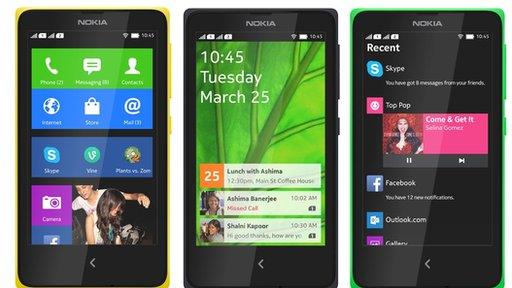Microsoft to release Android-powered Nokia X2 handset
- Published
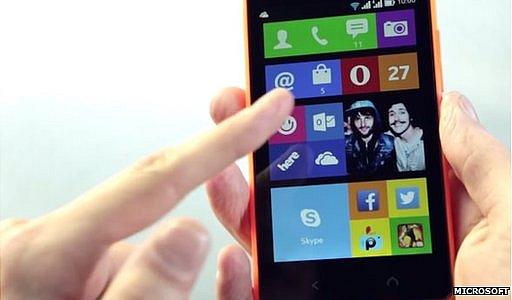
The Nokia X2 features an Android user interface that resembles Windows Phone
Microsoft has unveiled its first phone after completing its takeover of Nokia's handset division - and the device is powered by Android.
The operating system, developed by Google, is usually seen as a rival to Microsoft's own Windows Phone OS.
Microsoft said the Nokia X2 offered it a way to hook users into its cloud-based services, several of which come pre-installed as apps.
One expert said the alternative would have been leaving "money on the table".
"I still find it astounding that Microsoft is making Android phones, but there seems to be a steely determination to take a more open approach for the greater good of the whole company rather than just the Windows Phone platform," said Ben Wood, from the telecoms consultancy CCS Insight.
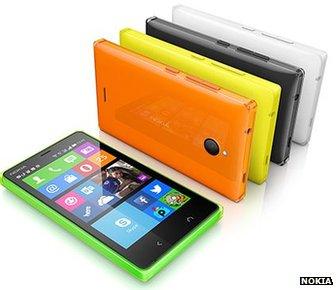
The Nokia X2 features a front-facing camera missing from the earlier model
"If they don't do this, then someone else is going to get the business.
"I also think it's a reflection of the fact that Nokia's budget Asha line of feature phones was unable to compete with entry-level Android mobiles."
Microsoft completed its takeover of Nokia's handset division on 25 April at a cost of 5.4bn euros ($7.4bn; £4.4bn).
'App gap'
The X2 is the follow-up to the original X, launched in February before Nokia sold its mobile business.
The original model became the best-selling mobile in Pakistan and the third best-selling handset in India - according to market-research company GfK - as well as achieving strong sales in Russia, Kenya and Nigeria.
a slightly bigger 4.3in (11cm) screen
1GB of RAM - double the amount of memory previously included
a more powerful battery
the addition of a front-facing camera for selfies
It will cost 99 euro ($135; £80) when released in July.
Microsoft's video chat app Skype, its Outlook email service and its OneDrive internet storage apps all come pre-loaded.
The firm is also promoting some of its other apps - including Bing Search, the Yammer business-focused social network and the OneNote idea jotting service - as optional free downloads for the device.
"The whole idea of bringing more people into Microsoft Cloud through these services is the very core of the strategy," Jussi Nevanlinna, vice-president of mobile phones product marketing at Microsoft, told the BBC.
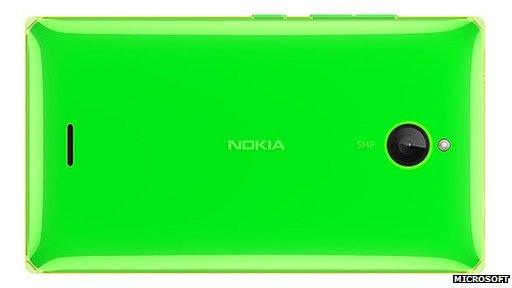
Microsoft says that it has used a new two-layer coating that makes the phone's case appear to "glow"
"In fact we're ahead of other Android devices [in this respect].
"But I want to stress that Lumia remains our primary smartphone strategy and that Nokia X is a stepping stone to it."
Missing apps
The tile-based homescreen and ability to see apps displayed as a scrollable list on the X2 mirrors the Window Phone user interface, which might help encourage consumers to later make the leap to Microsoft's more expensive Lumia range.
However, Mr Wood said there was a risk that the users would instead switch to other Android models since Windows Phone still lags behind its rival in terms of the amount of third-party software it offers.
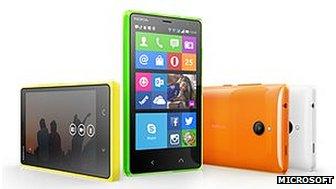
The Nokia X2 comes with Nokia Store, which excludes some of Google's apps found in Google Play
"That's the calculated risk that Microsoft is taking," he explained.
"The firm needs to rapidly close the app gap between the experience on an Android phone and the experience on a Windows Phone.
"But by going down this route it will at least inform Microsoft as to which apps it had better urgently get if it wants to secure people on the upgrade cycle."
Windows Phone now boasts over 250,000 apps including Instagram and Vine, which were high-profile absentees until November.
But several banking apps, games, video on-demand software, and apps used to control wearable fitness trackers - all available on Android - remain absent.
The Nokia X2 can run the bigger library of Android apps, but unless users hack the device they can only browse available software via the Nokia Store - which excludes some programs - rather than the more fully-stocked Google Play.
- Published20 June 2014
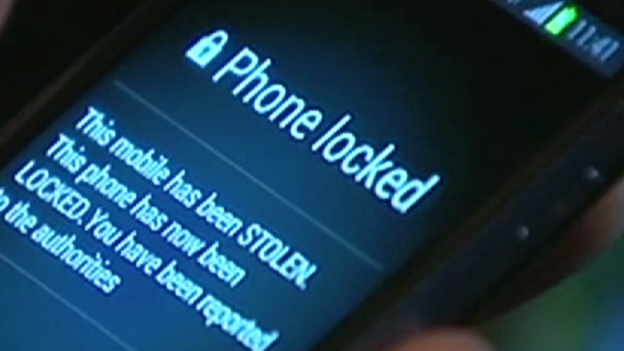
- Published18 June 2014
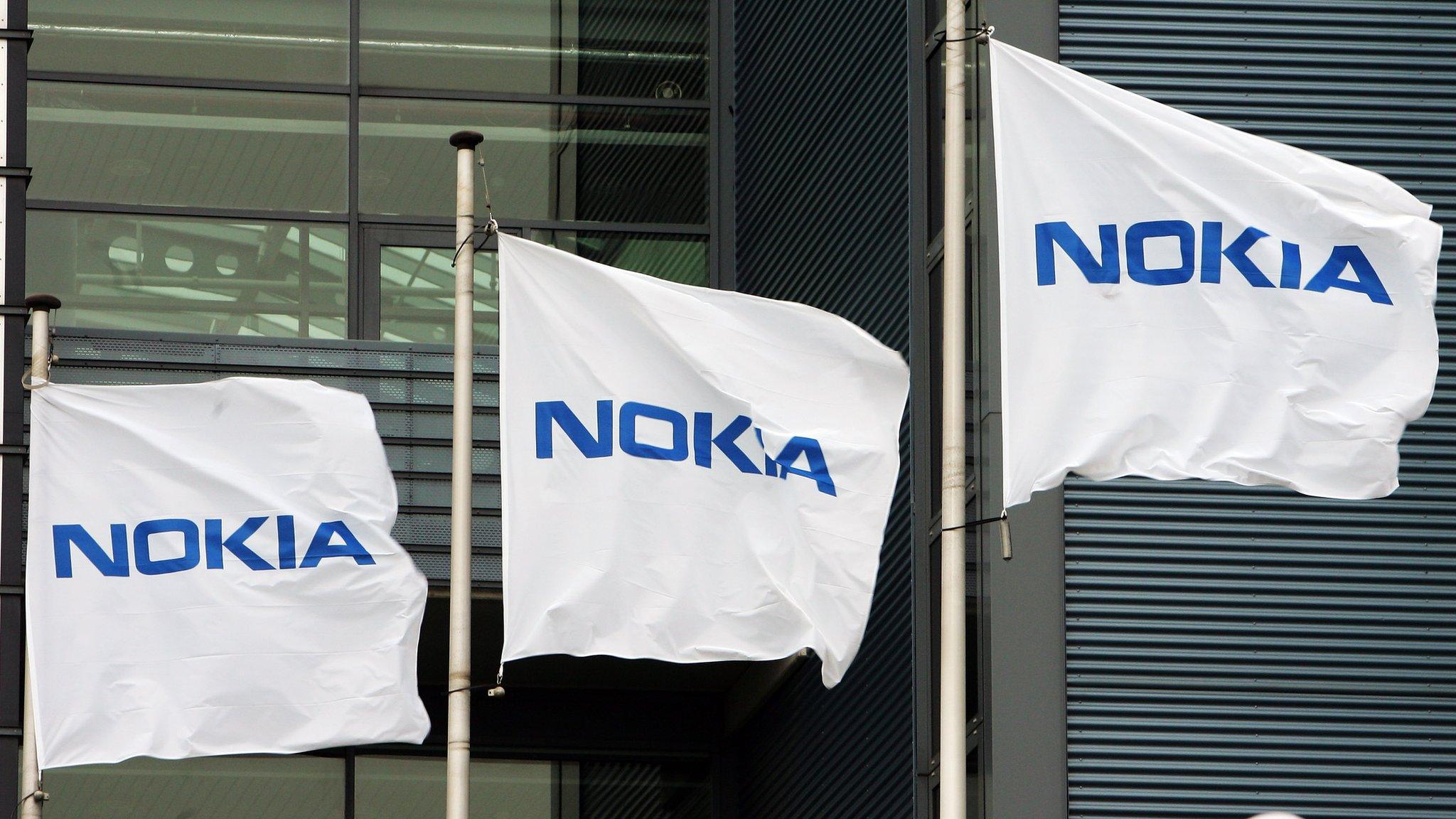
- Published24 February 2014
